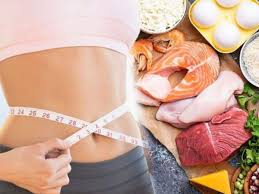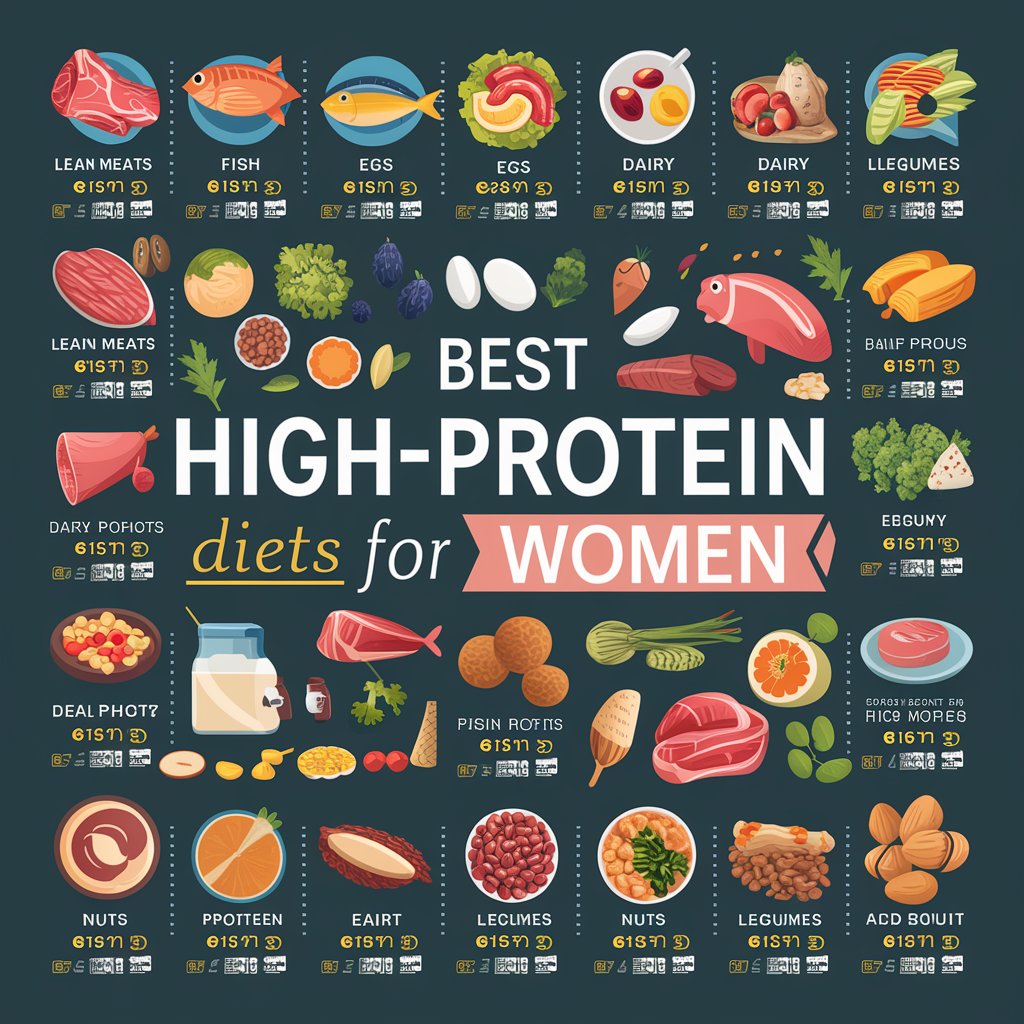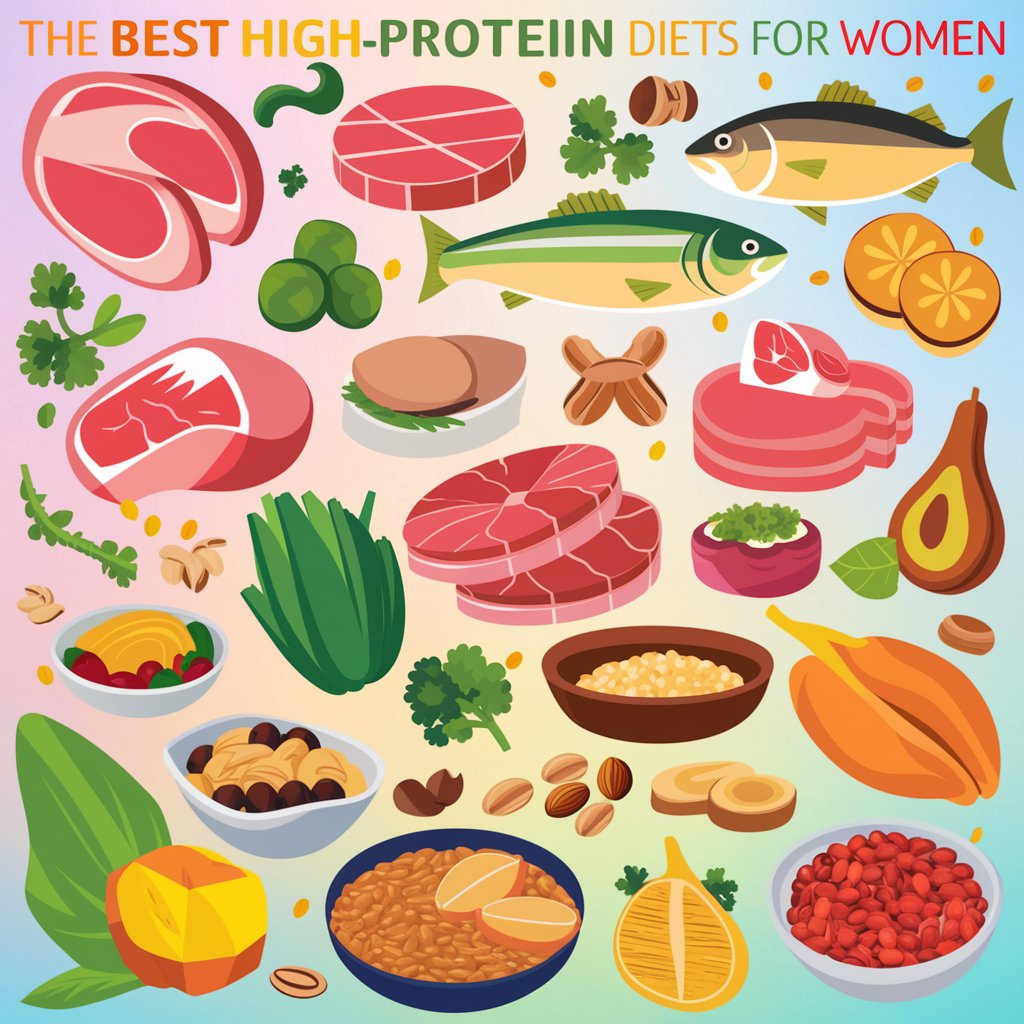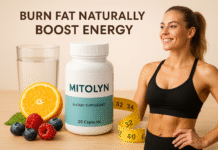Best High-Protein Diets for Women 2024 : Welcome to our comprehensive guide on “High-Protein Diets for Women”. In this article, we aim to break down the complexity of dietary proteins and highlight how women can leverage high-protein diets to lose weight and boost overall health. With a burgeoning interest in high-protein diets, it’s crucial to understand what they entail and how best to implement them.
Proteins, considered the building blocks of life, are essential for several bodily functions, including repairing body tissues and maintaining muscle mass. High-protein diets have gained popularity in recent years for their potential weight loss benefits, attributing to the feeling of fullness proteins tend to induce. Studies published by Harvard Health and Mayo Clinic suggest that consuming high-protein meals can help maintain a healthy weight and even contribute towards weight loss.
While there’s a plethora of high-protein foods available, we’ll be placing a special focus on lean meats, poultry, seafood, eggs, dairy products and plant-based proteins like beans, nuts and seeds. Each of these is packed with protein to varying degrees and has their nutritional pros and cons which we will explore in further sections.
Furthermore, it’s not enough to simply consume protein-rich foods; understanding the balance between proteins, carbs, and fats in your diet is critical. This is especially important for women who often juggle multiple roles and need sustained energy throughout the day. To achieve this, it’s vital to follow an effective diet plan which accommodates individual needs and preferences – so stay tuned!
As beneficial as high-protein diets may seem, it’s essential to remember that they’re not risk-free. For instance, overconsumption of certain protein-rich foods could potentially lead to health concerns. But don’t worry, we’ve got it covered! We will discuss these risks and benefits associated with high-protein diets in depth.
This article is meant to serve as a wide-ranging resource on top high-protein diets for women. Whether you’re an active gym-goer, a busy professional, or someone looking to shed a few pounds, you’ll find comprehensive insights on how incorporating more protein into your diet can help reach your goals. As you explore the sections ahead, you’ll understand how proteins work in your body, find out about delicious protein-rich foods and how to incorporate them into meals, as well as become aware of potential risks to keep in mind.
Although our guide is packed with valuable information pulled from trusted sources like Harvard Health and Mayo Clinic, we still recommend seeking individualized advice from healthcare professionals before making significant changes in your eating habits. So ladies, are you ready to unlock the power of proteins?
Table of Contents
The Science Behind High-Protein Diets
Before delving into high-protein diets, we must first understand what proteins are. Proteins are one of the three main macronutrients our body needs for its normal functioning. They are complex molecules made up of amino acids, often referred to as the ‘building blocks’ of life. According to WebMD, there are 20 different types of amino acids that can combine to make a protein.
The human body produces eleven of these, known as nonessential amino acids because we don’t need to get them from our diet. The remaining nine, termed essential amino acids, must be obtained through food.
When you eat protein-rich foods, your body breaks down the protein into these individual amino acids, which are then used in cell growth and repair. Thus, incorporating adequate amounts of protein in your diet is critical for optimal health.
But how does a high-protein diet contribute to weight loss? Typically, when you consume more protein than your body needs for cellular processes and maintenance of lean body mass, this excess protein will be used by your body to generate energy.
Several scientific studies suggest that high-protein diets can help people lose weight due to certain inherent properties of this macronutrient. To delve deeper into its mechanisms, let’s brush upon some clinical evidence.
Medical News Today cites several research studies implying that consuming a diet high in protein helps enhance the feeling of satiety or fullness. This feeling is mainly because protein reduces levels of ghrelin (the “hunger hormone”) and boosts peptide YY – a hormone that makes you feel full.
A study published in the Mayo Clinic Proceedings found that participants on a high protein diet reported feeling more satisfied after meals and maintained greater fullness throughout the day compared to those on a lower protein diet.
This increased feeling of fullness can lead to reduced calorie intake, ultimately leading to weight loss. Moreover, because proteins are harder for the body to break down than fats or carbohydrates, you burn more calories digesting them, known as the “thermic effect of food”. Hence, replacing some carbs and fats with protein can help increase your metabolic rate.
There’s also evidence suggesting that a high-protein diet helps preserve muscle mass during weight loss, encouraging fat burning. As you lose weight, your body tends to shed both muscle and fat. By increasing your protein intake while reducing your calorie intake concurrently, it can help ensure that most of what you lose is fat rather than muscle.
With these insights into the science behind a high-protein diet, understanding why they have become such popular aids for weight loss becomes clearer. However, it’s important to remember that while helpful in achieving weight control goals, no single nutrient including protein can be deemed as an all-encompassing solution. A balanced dietary approach encompassing all essential nutrients remains paramount to health and well-being.
Top High-Protein Foods
A variety of foods can serve as excellent sources of protein. We present some top picks to help you align your diet towards high-protein consumption, keeping in mind the differential protein content per serving to help balance your intake.
Lean Meats
Lean meats are a great source of protein and are low in saturated fat. According to Healthline, chicken breast is one of the leanest and highest protein-content meats available with nearly 26 grams of protein per 3-ounce serving. Similarly, lean cuts of beef like sirloin or eye round provide around 25 grams of protein per serving. To get the most health benefits, opt for grass-fed or organically raised meats when possible.
Poultry
Turkey and chicken are top choices when it comes to poultry – they’re both lean and packed with protein. Chicken provides approximately 21 grams of protein per 3-ounce serving while turkey offers about 24 grams.
Seafood
Seafood is another excellent source of high-quality protein. For instance, a 3-ounce serving of wild-caught salmon contains about 22 grams of protein according to Verywell Fit. Tuna, halibut, and shrimp are other seafood options that pack a significant amount of protein.
Eggs
Eggs are a dietary powerhouse containing a bit of almost every nutrient your body needs. A single large egg comes with approximately 6 grams of protein, making it an attractive option for those considering a high-protein diet.
Dairy Products
Certain dairy products like Greek yogurt, cottage cheese, and milk can be rich sources of protein. For instance, a cup of non-fat Greek yogurt has up to 24 grams of protein. Combine these with fruits or nuts for a high-protein snack!
Plant-Based Proteins: Beans, Nuts, and Seeds
Not all proteins must come from animal sources. Beans, nuts and seeds offer a substantial amount of protein per serving too. According to BBC Good Food, 3-ounces of cooked lentils contain about 12 grams of protein while chickpeas (also known as garbanzo beans) provide around 15 grams.
Nuts and seeds are also excellent sources of protein. Almonds, peanuts, sunflower seeds, flaxseeds, and chia seeds have between 5 to 7 grams of protein per ounce.
While each type of food has its unique benefits beyond just their protein content – such as providing essential vitamins, minerals and fiber – it’s also crucial to note that overconsumption could lead to potential health risks like any other nutrient. Everything in moderation remains the mantra for ensuring optimal health.
Building a Balanced Protein Diet Plan
Cultivating a high-protein diet plan isn’t just about piling up protein-rich foods on your plate. It’s pivotal to strike a balance among proteins, carbs, and fats in your meals, considering overall calorie intake as well. EatingWell suggests that an optimal high-protein diet for women should consist of approximately 25-30% of daily calories from protein, which equates to around 75 to 105 grams of protein for those consuming a 2000 calorie diet.
The key is to distribute this intake across meals and not load it all at once. A balanced meal platter would include lean proteins along with vegetables, whole grains, and healthy fats. Here’s an illustration of what a balanced high-protein diet might look like over a week:
A Sample 7-Day High-Protein Diet Plan
- Day 1: Breakfast – Greek yogurt with almonds and berries; Lunch – Lentil salad with mixed greens; Dinner – Grilled salmon with quinoa and roasted vegetables.
- Day 2: Breakfast – Scrambled eggs with spinach, served on whole grain toast; Lunch – Grilled chicken Caesar salad (with light dressing); Dinner – Beef stir-fry served with brown rice.
- Day 3: Breakfast – Protein smoothie with whey protein, banana and peanut butter; Lunch – Quinoa salad with grilled shrimps; Dinner – Turkey meatballs served with whole grain pasta.
- Day 4: Breakfast – Oatmeal topped with nuts and seeds; Lunch – Tuna salad wrapped in romaine lettuce; Dinner – Grilled chicken with sweet potatoes and broccoli.
- Day 5: Breakfast – Whole grain toast with avocado and poached egg; Lunch – Greek-style stuffed peppers with ground turkey; Dinner – Pan-seared tilapia served with quinoa and green beans.
- Day 6: Breakfast – High-protein pancakes served with strawberry compote; Lunch – Chicken and vegetable stir-fry; Dinner – Baked cod fish served with brown rice and asparagus.
- Day 7: Breakfast – Cottage cheese with fresh fruits; Lunch – Chickpea salad served on a bed of mixed greens; Dinner – Lean steak with baked sweet potato fries.
This sample meal plan should give you an idea of how to structure your days and meals to incorporate a variety of protein sources. However, it is important to remember that dietary needs can vary from one individual to another depending on factors such as age, gender, weight, physical activity level, and overall health status. As such, this plan should be adapted according to personal preferences and dietary requirements.
Lastly, do keep in mind that while lean proteins form the core of your diet, Forbes advises not neglecting the significant role played by other nutrients like carbs and fats. For instance, whole grains provide sustained energy through complex carbs while mono-unsaturated and polyunsaturated fats found in foods like avocados and olive oil promote heart health. It’s about creating a diverse plate for overall well-being.
In conclusion, building a balanced high-protein diet involves careful planning but considering the potential benefits, it’s indeed worth the effort! Remember: the best diet is the one you can stick to for the longest, so personalization is key.“` “`
Potential Benefits And Risks of High-Protein Diets
To create a well-rounded understanding of high-protein diets, it’s crucial to scrutinize the potential benefits and risks associated with them. Let’s start by shedding light on the advantages beyond weight management.
Benefits Beyond Weight Loss
Apart from facilitating weight loss, higher protein intake can offer several other health benefits. Firstly, proteins play an essential role in muscle development and maintenance. According to Women’s Health Magazine, consuming more protein might lead to greater strength gains if combined with resistance training, which is an added advantage for women aiming to increase their lean body mass.
Secondly, a diet rich in protein may also promote better bone health. Some recent studies have found that women who consume higher amounts of protein tend to maintain their bone mass better as they age – potentially reducing the risk of osteoporosis and fractures.
Moreover, a diet high in protein can sometimes lower blood pressure levels and fight against bad LDL cholesterol – aiding heart health. Additionally, some research suggests that high-protein diets could even improve mood by influencing the production of serotonin – a chemical responsible for maintaining mood balance.
Risks Associated With High-Protein Diets
While there’s no denying that high-protein diets can deliver some impressive health perks, it’s equally important to be aware of potential health concerns that might surface due to overconsumption of proteins or long-term adherence to such diets.
The first thing worth noting is that people with certain pre-existing conditions must tread carefully when considering high-protein diets. For example, those diagnosed with kidney disease should avoid high-protein diets as excess protein could worsen their condition by putting additional strain on the kidneys.
Furthermore, if someone leans heavily on high-protein foods that are also high in unhealthy fats and cholesterol – such as processed meats and full-fat dairy products – there could be a potential increase in heart disease risk. Hence, opting for lean proteins which are low in saturated fat is highly recommended.
Lastly, while higher protein diets can aid weight loss, some people might misinterpret this to mean they can exclude other essential nutrients like carbohydrates and fats from their diet. This sort of lopsided eating pattern could have detrimental effects on health – leading to deficiencies, poor energy levels and even harm gut health over time.
In conclusion, like any diet plan, high-protein diets come with their set of pros and cons. However, by choosing lean sources of protein and maintaining balance with other macronutrients – carbs and fats – along with an adequate intake of fruits & vegetables, one can reap the benefits while mitigating risks.
Remember, these dietary strategies should not replace any medical advice. Always consult your healthcare provider or enlist the help of a registered dietitian to ensure that any changes to your diet will support your overall health goals and specific nutritional needs.
Conclusion: Best High-Protein Diets for Women
In conclusion, embarking on a high-protein diet can be a valuable tool for women looking to lose weight and improve their overall health. By incorporating lean meats, poultry, seafood, eggs, beans, nuts, seeds, and dairy into their everyday meals, women can ensure they are getting an adequate amount of protein to support their bodily functions.
Throughout this article, we have explored the science behind high-protein diets and how they contribute to weight loss. We have discussed the various mechanisms through which proteins induce satiety and boost metabolism. Additionally, we have highlighted the top high-protein foods and their nutritional benefits.
Building a balanced protein diet plan is crucial to ensure that women are meeting their protein needs while also maintaining a healthy balance of carbohydrates and fats. By following a sample 7-day meal plan or customizing their own, women can create a sustainable high-protein diet that suits their individual preferences and dietary requirements.
While there are numerous benefits to adopting a high-protein diet, it is important to be aware of the potential risks associated with overconsumption or long-term adherence to such diets. Consulting with healthcare professionals or registered dietitians before making significant dietary changes is essential.
Each person’s body is unique and responds differently to different diets. It is important for women to listen to their bodies and make adjustments as necessary. What works for one person may not work for another.
We have gathered information from reputable sources such as Harvard Health, Mayo Clinic, Verywell Fit, Women’s Health Magazine, and others to provide you with accurate and reliable information on high-protein diets for women.
Remember that sustainable weight loss and improved health require a comprehensive approach that encompasses not just diet but also exercise, stress management, sleep quality, and other lifestyle factors.
Incorporating more protein into your diet can be a great step towards achieving your health goals. But always remember that balance is key. It’s important to maintain a varied and nutrient-rich diet that includes all essential macronutrients along with regular physical activity.
We hope this guide has empowered you with the knowledge and understanding necessary to unlock the best high-protein diets for women. Remember to seek personalized advice from healthcare professionals before making any major dietary changes for optimal results.
So go ahead and start your journey towards a healthier you by embracing the power of proteins!




